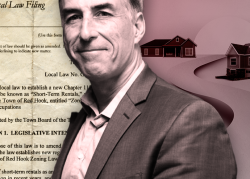Regulation of short-term rentals has been beefed up in New York City and introduced in various upstate and Long Island towns, but New York’s capital remains the Wild West for Airbnbs.
For the first time, though, Albany is exploring reining them in, the Times Union reported. Council member Sergio Adams is working on legislation in response to complaints about problematic short-term rentals.
The legislation, which has yet to be introduced, would force homeowners to register properties as short-term rentals and pay a fee. That would enable the city to easily contact owners if issues arose.
A handful of residents in the Hudson Park neighborhood recently called for the Common Council to regulate or even ban short-term rentals. The residents lamented trash being left outside by guests and being unable to reach or even identify owners of the rental properties.
Read more



“These rentals are commercial enterprises in a residential neighborhood,” one resident said, according to the Times Union. “They undermine the stability of our neighborhood.”
The Real Deal has reached out to Airbnb for comment.
Airbnb, VRBO and other short-term rental apps face a growing movement to regulate the industry. In New York, a state lawmaker recently introduced a bill that would help municipalities track, regulate and tax short-term rentals via a statewide registry.
In response, an Airbnb spokesperson said in a statement, “We have worked closely with dozens of communities across the state, and as people continue to navigate the rising cost of living, we are committed to promoting responsible hosting which contributes to the local economy.”
The Hudson Valley town of Red Hook is among the upstate communities where short-term rental regulation is being considered.
And in New York City, where illegal rentals have largely evaded enforcement for years, Local Law 18 is requiring the creation of a short-term registry. The registration process remains a work in progress, but the Office of Special Enforcement has proposed a series of rules for implementation that could help landlords avoid fines for their tenants’ unauthorized rentals.
— Holden Walter-Warner
